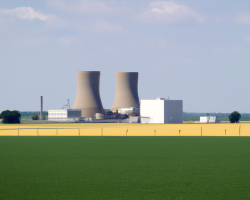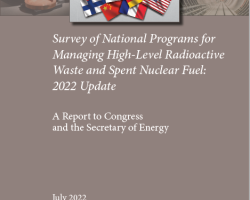Category of Content
Siting Experience Documents Only
Publication Date
Subject Matter
Measurement of Particulate Retention in Microchannel Flows
Measurement of Particulate Retention in Microchannel Flows
EVALUATION OF THE FREQUENCIES FOR CANISTER INSPECTIONS FOR SCC
EVALUATION OF THE FREQUENCIES FOR CANISTER INSPECTIONS FOR SCC
Uncertainty Quanti?cation of Environmentally Assisted Stress Corrosion Cracking in Used Fuel Canisters
Uncertainty Quanti?cation of Environmentally Assisted Stress Corrosion Cracking in Used Fuel Canisters
Review of NDE Methods for Detection and Monitoring of Atmospheric SCC in Welded Canisters for the Storage of Used Nuclear Fuel
Review of NDE Methods for Detection and Monitoring of Atmospheric SCC in Welded Canisters for the Storage of Used Nuclear Fuel
Crack Growth Rate and Large Plate Demonstration of Chloride-induced Stress Corrosion Cracking in Spent Nuclear Fuel Storage Canisters
Crack Growth Rate and Large Plate Demonstration of Chloride-induced Stress Corrosion Cracking in Spent Nuclear Fuel Storage Canisters
Continued Investigations of Respirable Release Fractions for Stress Corrosion Crack-Like Geometries
Continued Investigations of Respirable Release Fractions for Stress Corrosion Crack-Like Geometries
Chloride-Induced Stress Corrosion Cracking Test System Construction and Test Plan
Chloride-Induced Stress Corrosion Cracking Test System Construction and Test Plan
Intergenerational Ethical Issues and Communication Related to High-Level Nuclear Waste Repositories
Intergenerational Ethical Issues and Communication Related to High-Level Nuclear Waste Repositories
Purpose of Review: The nuclear power industry started in the 1950s and has now reached a phase of disposing high-level nuclear waste. Since the 1980s, the United Nations has developed a concept of sustainable development and governments have accordingly made ethical commitments to take responsibility towards future generations. The purpose of this review is to examine ethical dilemmas related to high-level nuclear waste disposal in a long-term perspective including potential access to the waste in the future.
Science based responses to social myths on nuclear energy
Science based responses to social myths on nuclear energy
In order to promote a sound basis for considering the role of nuclear in climate change, this review spans the technical topics of social and political debate surrounding nuclear energy with a focus on the objective science of these issues including nuclear waste, accidents and overall risk. Novel aspects include the emergence of nuclear energy as being potentially renewable and the antithesis of Fukushima being an argument for the unacceptable risks associated with the use of nuclear energy.
Survey of National Programs for Managing High-Level Radioactive Waste and Spent Nuclear Fuel: 2022 Update
Survey of National Programs for Managing High-Level Radioactive Waste and Spent Nuclear Fuel: 2022 Update
In October 2009, the U.S. Nuclear Waste Technical Review Board (Board or NWTRB) published Survey of National Programs for Managing High-Level Radioactive Waste and Spent Nuclear Fuel. For each of the 13 national programs studied, the report catalogued 15 institutional arrangements that had been set in place and 15 technical approaches that had been taken to design repository systems for the long-term management of high-activity radioactive waste.


